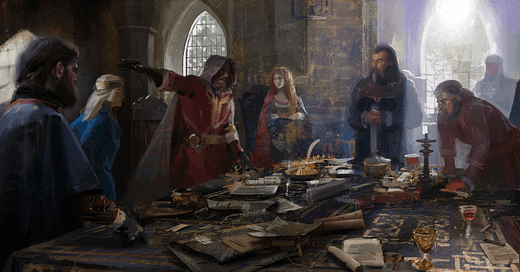In Which I Use a Video Game to Make a Point About the Relationship Between Personality Types, Cultural Values, and Mental Health
Or, The Head That Wears the Crown Doesn't Necessarily Have To Be Heavy
Video games, like all art forms, have the ability to hold up a mirror to life and give us insight into what it means to be human. They can do this through compelling storytelling, like in The Last of Us (storytelling so great it became a hit show on HBO). They can do it by incorporating themes and motifs from mythology and history, like in the Final Fantasy series. They can also achieve this through game mechanics—the rules, the physics, the objectives, or other aspects.
This is the case with Crusader Kings 3, a grand strategy game a friend recently recommended to me that contains one of the most (personally) satisfying game mechanics I’ve ever encountered: Stress.
Let me briefly explain. In CK3, you play as a historical ruler in the middle ages and your primary objective is simply to ensure that your dynasty continues to exist. When the character you select dies, you then switch and play as that character’s heir. All the while, you are making decisions about cultural and religious reforms, how to manage your vassals, who to marry, how to educate your children, if you should invade, if you should throw a feast for barons, if you should poison your enemies, and too many others to list, though you can see many, many more here.
The characters are not just interchangeable digital avatars. Rulers have a variety of different sorts of traits that govern their strengths and weaknesses. Like in real life, some of these traits are genetic. Some of these traits are acquired through education. Still others are the result of specific life experiences like a death in the family.

In addition to influencing a character’s skill level, traits also determine what kinds of challenges are stressful. For example, if your character is ambitious, then granting someone their independence will increase your stress. If you are content, then taking the throne will increase your stress levels. If you are greedy, giving someone a gift is stressful. So on and so forth. You can see a more extensive list here.
What I love about this so much—and the mirror it holds up to reality—is how a mix of genetic and environmental forces shape who we are as people. Then, in turn, those same traits influence how we interact with our environment. And to take the abstraction a bit further, across time and culture, certain traits will help or hinder you more or less.
April was National Stress Awareness Month and May is National Mental Health Month, and I think CK3 provides a good vehicle to discuss how our cultural values generate stress. Specifically, I think two traits—ambition and content—are a good case study. Both words have positive and negative connotations. For some people, ambition simply means a desire to achieve as much as they can. But a darker meaning—and the primary definition for Merriam-Webster—is an ardent desire for rank, fame, or power. For some, being ambitious is an asset; for others, a liability. Content can mean a feeling of satisfaction, or it can mean to limit oneself for some reason.
These distinctions are key because of how they relate cultural expectations. We’re shouted at from all angles to constantly attain more, which means we’re always focused on the future. We have to get good grades to get into a good college to get a good job, and then we have to keep producing more and more to earn more money and more respect among our peers. Yes, in quiet corners you will encounter quant messaging about smelling the roses and the like, but that doesn’t pay the bills and that is not the message our economic policy sends.
It is the message they send in a place like Finland, which consistently ranks as one of the “happiest” countries in the world and emphasizes appreciation over ambition. This value bleeds into how society is organized in material ways. As Teemu Kiiski, a Finnish designer, told The New York Times, strong public funding for things like the arts “affects the kind of work that we make, because we don’t have to think of the commercial value of art. … So what a lot of the artists here make is very experimental.”
It’s not perfect, of course. Some Finnish people say that they are suspicious of what “happy” even really means (I tend to concur) and that knowing they are supposed to be the happiest place in the world puts pressure on them to…be happy, which actually makes perfect sense because comparing our lives to the lives of others is one of the most stressful behaviors we engage in.
But nonetheless, the Finnish model seems much more supportive of what Self-Determination Theory refers to as basic psychological needs that fuel human wellness: competence, autonomy and relatedness. These are intrinsic values, things that are their own reward. Mastering a skill feels good, the ability to act of your own volition feels good, forming genuine relationships with other people feels good. On the other hand, extrinsic values—wealth and status, the things Americans often equate with success—can actually undermine wellbeing.
Ironically, in Crusader Kings 3, “ambition” and “content” are mutually exclusive traits. They are each other’s opposite. Different cultures reward different types of personality traits, but we have a say—collectively—on what those traits are. We currently reward ambition more than we reward being content, at least in terms of what is commonly understood to mean success. We cannot separate that from the discussions related to stress and mental health.





